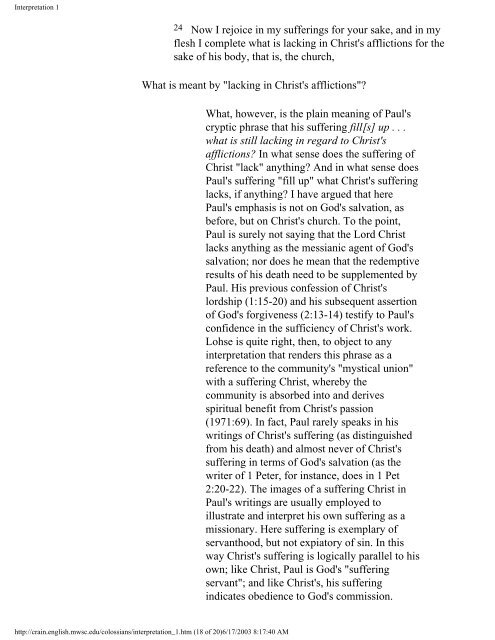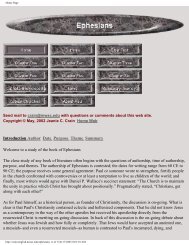Introduction to Colossians: Authorship, Date, Audience - Crain Home
Introduction to Colossians: Authorship, Date, Audience - Crain Home
Introduction to Colossians: Authorship, Date, Audience - Crain Home
Create successful ePaper yourself
Turn your PDF publications into a flip-book with our unique Google optimized e-Paper software.
Interpretation 1<br />
24 Now I rejoice in my sufferings for your sake, and in my<br />
flesh I complete what is lacking in Christ's afflictions for the<br />
sake of his body, that is, the church,<br />
What is meant by "lacking in Christ's afflictions"?<br />
http://crain.english.mwsc.edu/colossians/interpretation_1.htm (18 of 20)6/17/2003 8:17:40 AM<br />
What, however, is the plain meaning of Paul's<br />
cryptic phrase that his suffering fill[s] up . . .<br />
what is still lacking in regard <strong>to</strong> Christ's<br />
afflictions? In what sense does the suffering of<br />
Christ "lack" anything? And in what sense does<br />
Paul's suffering "fill up" what Christ's suffering<br />
lacks, if anything? I have argued that here<br />
Paul's emphasis is not on God's salvation, as<br />
before, but on Christ's church. To the point,<br />
Paul is surely not saying that the Lord Christ<br />
lacks anything as the messianic agent of God's<br />
salvation; nor does he mean that the redemptive<br />
results of his death need <strong>to</strong> be supplemented by<br />
Paul. His previous confession of Christ's<br />
lordship (1:15-20) and his subsequent assertion<br />
of God's forgiveness (2:13-14) testify <strong>to</strong> Paul's<br />
confidence in the sufficiency of Christ's work.<br />
Lohse is quite right, then, <strong>to</strong> object <strong>to</strong> any<br />
interpretation that renders this phrase as a<br />
reference <strong>to</strong> the community's "mystical union"<br />
with a suffering Christ, whereby the<br />
community is absorbed in<strong>to</strong> and derives<br />
spiritual benefit from Christ's passion<br />
(1971:69). In fact, Paul rarely speaks in his<br />
writings of Christ's suffering (as distinguished<br />
from his death) and almost never of Christ's<br />
suffering in terms of God's salvation (as the<br />
writer of 1 Peter, for instance, does in 1 Pet<br />
2:20-22). The images of a suffering Christ in<br />
Paul's writings are usually employed <strong>to</strong><br />
illustrate and interpret his own suffering as a<br />
missionary. Here suffering is exemplary of<br />
servanthood, but not expia<strong>to</strong>ry of sin. In this<br />
way Christ's suffering is logically parallel <strong>to</strong> his<br />
own; like Christ, Paul is God's "suffering<br />
servant"; and like Christ's, his suffering<br />
indicates obedience <strong>to</strong> God's commission.






![[38cb1273][0][sourcelist][1][0] - Crain Home](https://img.yumpu.com/2168350/1/190x245/38cb12730sourcelist10-crain-home.jpg?quality=85)